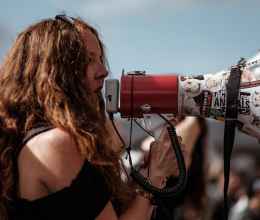
After the shooting at Marjory Stoneman Douglas High School, the world wept “not again,” routine talking points were dusted off, and thoughts and prayers rolled in.
Then the students who survived an attack, stood up to declared: “Never again!”
The systems designed to protect our children failed: from the interventions to heal troubled youth to the political institutions charged with preventing such a crisis.
The students of Marjory Stoneman Douglas High students don’t accept those failures as inevitable. They follow a tradition of action. Their school’s namesake was a crusader for justice who forced us to recognize the value of Florida’s wetlands, demanded voting rights for women, and built the first ACLU chapter in the South. These students want to pursue their education in a safe environment, and like her, they demand meaningful action.
Their calls for legislative action on military-style automatic weapons and large-scale magazines hit a brick wall in Tallahassee. But while the Second Amendment confers a right to bear arms, the Constitution does not prevent lawmakers from adopting effective measures to restrain gun violence.
It is a dangerous oversimplification to suggest that lawmakers are prohibited from adopting reasonable restrictions to prevent communities — and schools — from becoming war zones. Lawmakers can require universal background checks, close loopholes in how guns are purchased, limit ammunition capacity, ban dangerous modifications, and ban dangerous and unusual weapons.
None of these restrictions would violate the constitution. Indeed, the Supreme Court has declined to review failed challenges to bans on assault weapons adopted by four states.
Beyond these restrictions, the Center for Disease Control should be permitted to research the causes of gun violence. We can invest in community mental health services, add more school counselors, and expand programs to help our youth develop the skills to navigate crises.
What we cannot do is ask our students to bear more of the burden of gun violence. Our kids, especially youth of color, are being arrested at school for misbehavior once handled by school administrators. A generation is being pushed from the classroom to the prison cell.
Adding more school resource officers without defining their role will increase arrests. Eighty percent of Florida districts already have an officer at every high school; many have more than one. They are too often involved in routine discipline, resulting in increased youth interaction with the criminal justice system. Reacting to this tragedy by doubling down on the school-to-prison pipeline is counterproductive.
Marjory Stoneman Douglas said, “You have to stand up for some things in this world.” Students across the nation are doing exactly that. School boards and administrators should honor student activism and not discipline their students for finding their voices in a healthy debate. These protests are not disruptive to the learning environment — they are the learning environment.
The students’ persistent chant of “Never Again!” echoes previous generations.
The courage of students led the way in the civil rights movement to end racial segregation at lunch counter sit-ins and on Freedom Rides.
It’s time to listen to these students and to stop misusing the Constitution to shut down the debate about how to end gun violence.
A version of this op-ed first appeared in the Sun Sentinel.
